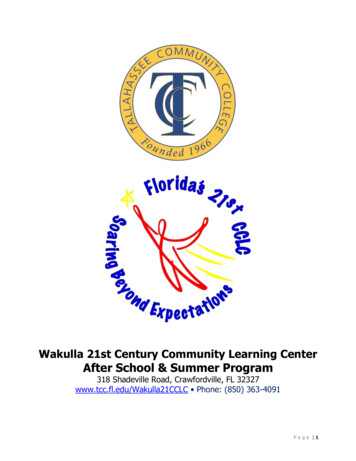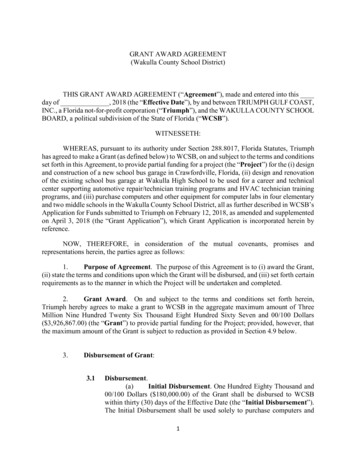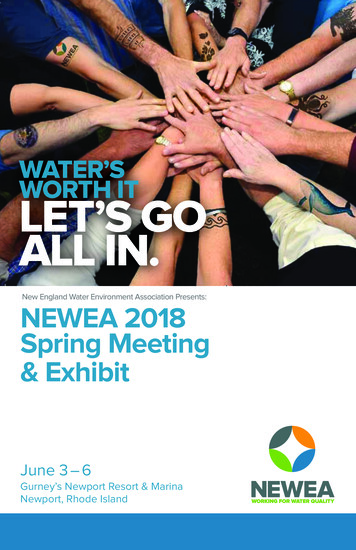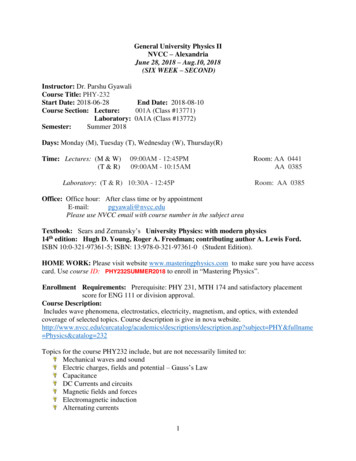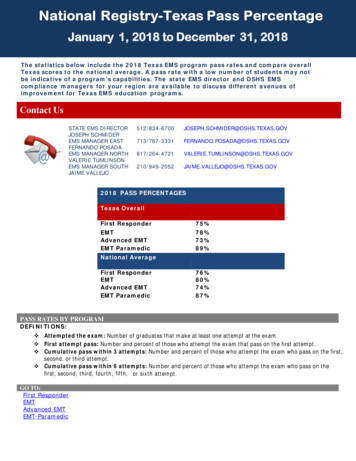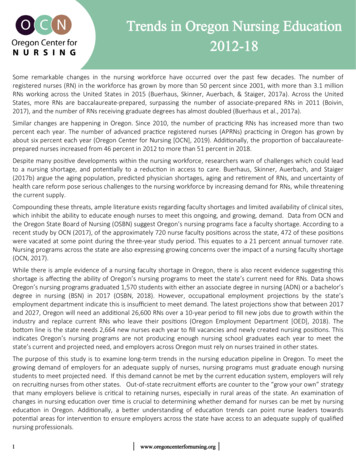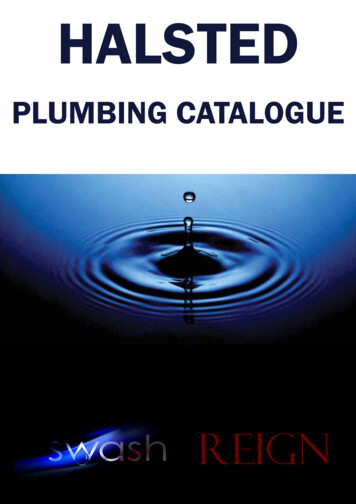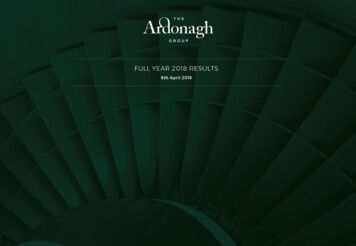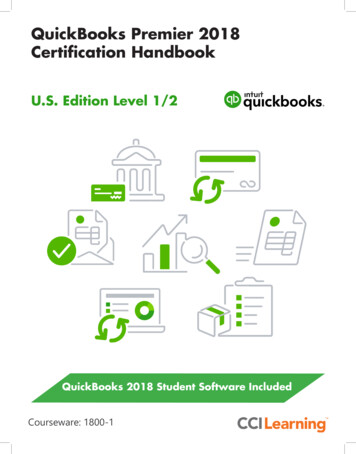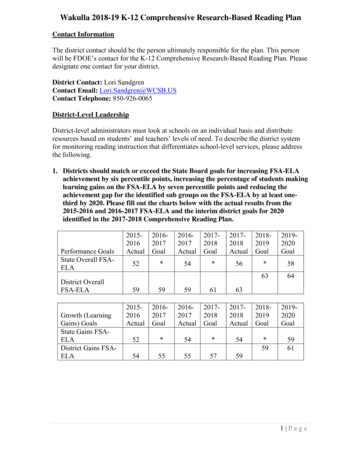
Transcription
Wakulla 2018-19 K-12 Comprehensive Research-Based Reading PlanContact InformationThe district contact should be the person ultimately responsible for the plan. This personwill be FDOE’s contact for the K-12 Comprehensive Research-Based Reading Plan. Pleasedesignate one contact for your district.District Contact: Lori SandgrenContact Email: Lori.Sandgren@WCSB.USContact Telephone: 850-926-0065District-Level LeadershipDistrict-level administrators must look at schools on an individual basis and distributeresources based on students’ and teachers’ levels of need. To describe the district systemfor monitoring reading instruction that differentiates school-level services, please addressthe following.1. Districts should match or exceed the State Board goals for increasing FSA-ELAachievement by six percentile points, increasing the percentage of students makinglearning gains on the FSA-ELA by seven percentile points and reducing theachievement gap for the identified sub groups on the FSA-ELA by at least onethird by 2020. Please fill out the charts below with the actual results from the2015-2016 and 2016-2017 FSA-ELA and the interim district goals for 2020identified in the 2017-2018 Comprehensive Reading Plan.Performance GoalsState Overall FSAELADistrict OverallFSA-ELAGrowth (LearningGains) GoalsState Gains FSAELADistrict Gains 0192020Goal52*54*545455555759*5959611 Page
State AchievementGaps on ents withDisabilities/Studentswithout DisabilitiesEnglish LanguageLearners/ NonEnglish 30*32*31*20District2015- 2016- 2016- 2017- 2017- 2018- 2019Achievement Gaps2016201720172018201820192020on FSA-ELAActual GoalActual GoalActual nomicallyDisadvantaged20192219182721Students withDisabilities/Studentswithout Disabilities3230323038English LanguageClick00Learners/ Nonhere toEnglish LanguageenterLearners000text.0* Values for subsequent years will be entered once results are available in order to trackprogress toward the 2020 goal.2 Page
2. Explain how expenditures from the allocation are expected to impact studentachievement in relation to your district goals.District goals for student achievement are reviewed upon receipt of the FSA scores eachyear. We will also review data Renaissance Universal screener (STAR) to help determinethe reading needs of our students. Through analyzing data, a grade level reading flowchart of district approved programs has been created to provide guidance to our schoolsand assure continuity of instruction. This reading flow chart aligns with the MTSSprocess and helps assure equality of resources for every students. The allocation will payfor the designated reading teachers for our neediest students, help with the cost of literacyprograms included in the district flow chart, and combine with other district funds toprovide appropriate professional development and assure fidelity of implementation.Each program and curriculum outline has been chosen and/or created to help close theachievement gap. District wide training on each program and implementation will beoffered through professional development this summer. Monitoring of implementationwill be handled at school level, as well as district level. Through implementation of thegrade level reading flow chart, collaboration, and classroom monitoring, studentachievement will improve.3. In regard to district-level monitoring of student achievement progress, pleaseaddress the following:A. Who at the district level is responsible for collecting and reviewing studentprogress monitoring data?District Instructional Service Staff- A district-level data review calendar has beencreated to assure timely and effective review of data.B. What specific school-level progress monitoring data will be collected at thedistrict level to determine that students are progressing toward the districtgoals stated above? Please specify which grade levels are associated withspecific school-level progress monitoring tools discussed in this section.K-12 students are assessed through a uniform assessment (STAR Reading) threetimes per year. This data is reviewed at classroom, school, and district level for thepurpose of identifying students who are exceeding, meeting, and struggling to meetdistrict goals. These assessment are given August, January and May. In addition,elementary schools use Standards Based Assessment data to help identify students inneed of additional support, and course grades indicate students in need of interventionat the middle and high school levels.3 Page
C. How often will student progress monitoring data be collected and reviewed bythe district?Principals are tasked with collecting walk-through data. In addition, ReadingCoaches and District Instructional Services staff conduct walk-throughs on a monthlybasis. The District Reading Contact meets monthly with Reading Coaches to reviewdata from schools. Monthly administrative meetings with school leaders are also heldto review data. Leadership meetings focus on training administrators to addressinstructional needs identified through the data collections. A plan for data review isoutlined in the MTSS Handbook, which requires teachers to review data and setlearning goals based on specific student’s data. Administrators monitor to assure thatinstruction aligns with set learning goals. District-level instructional staff willspecifically monitor data after each administration of the universal screener, quarterlyafter each grading period, and during monthly Reading Coach meetings.4. Who at the district level is responsible for ensuring the fidelity of students notprogressing towards district goals receiving appropriate interventions?The primary responsibility lies with the District Reading Contact with support from allDistrict Instructional Service Staff5. In regard to district-level monitoring of instructional alignment to grade-levelFlorida Standards, please address the following:A. Who at the district-level is responsible for ensuring classroom instruction isaligned to grade-level Florida Standards?District Instructional Services staff is responsible for ensuring classroom instructionis aligned to grade-level Florida Standards, as well as assistant from school-leveladministration.B. What evidence will be collected to demonstrate that classroom instruction isaligned to grade-level Florida Standards?District Leadership Team will hold monthly meeting to discuss data, curriculum andstandards based lessons. Leadership meeting will include training for administratorson how to address instructional needs through standard based lessons. An ongoingdistrict-wide professional development (SATL) is offered to teachers to help assistthem in creating standard based lesson plans. A stipend is provided for participation.C. How often will this evidence be collected at the district level?Standard based lessons and assessment evidence will be turned in once a semester toInstructional Services to ensure alignment and to meet qualification for thedesignated stipend.4 Page
6. In regard to access to informational text for each content area in a variety ofmediums, please address the following:A. Who at the district level will be responsible for ensuring that schools haveaccess to informational text for each content areas in a variety of mediums?It is monitored through the District Instructional Services office. The CurriculumSoftware Specialist monitors usage reports, and walk-throughs, grade level meetings,and administrative meetings are all used to monitor implementation in theclassrooms.B. In addition to using texts from core, supplemental and intervention programs,what will the district do to ensure that schools have access to informational textfor each content area in a variety of mediums?The district has contracted with Renaissance Place for the purpose of providing aportal for text selections. Grade level teams during the summer work together toidentify complex test and create text sets for use in instruction. In addition, the districthas worked with the Literacy Design Collaborative to help teachers build modulesencompassing a wide variety of complex text. Digital resources are used to providetext in a variety of mediums.7. In regard to Universal Design for Learning (UDL), please address the following:A. Who at the district level will ensure that the all classroom instruction isaccessible to the full range of learners using UDL principles?District and school leadership will monitor implementation, including UDLprinciples, at least three times during the school year.B. What evidence will the district collect to demonstrate that all classroominstruction is accessible to the full range of learners using UDL principles foreffective instructional design (planning) and delivery (teaching)?The District has implemented an initiative to train all teachers in the use of Kaganstructures. The purpose of this training is to increase differentiation, access andengagement in classrooms. This training has included job-embedded coaching andthe collection of walk through data to monitor teacher implementation. Additionaltraining will be conducted during the summer.C. How often will this evidence be collected at the district level?District and school leadership will monitor implementation, including UDLprinciples, at least three times during the school year.5 Page
8. As a separate attachment please provide the meeting agenda which demonstratesthe district contact for the K-12 Comprehensive Research-Based Reading Plan hasmet with the district contact for Exceptional Student Education (ESE) to discussthe alignment between the District's Special Programs and Procedures (SP&P)requirements and the district's 2018-2019 K-12 Comprehensive Research-BasedReading Plan, as well as documentation that the district contact for the K-12Comprehensive Research-Based Reading Plan has met with the district ELLcontact to discuss alignment with their district ELL plan.See Appendix A.Research-Based Reading Instruction AllocationAs per Section 1011.62(c), F.S., funds allocated under this subsection must be used toprovide a system of comprehensive reading instruction to students enrolled in the K-12programs, which may include the following: An additional hour per day of intensive reading instruction to students in the 300lowest-performing elementary schools by teachers and reading specialists who areeffective in teaching reading; Kindergarten through grade 5 reading intervention teachers to provide intensiveintervention during the school day and in the required extra hour for studentsidentified as having a reading deficiency; Highly qualified reading coaches to specifically support teachers in makinginstructional decisions based on student data and improve teacher delivery ofeffective reading instruction, intervention and reading in the content areas based onstudent need; Professional development for school district teachers in evidence-based readinginstruction, including strategies to teach reading in content areas with an emphasison technical and informational text; Summer reading camps, using only teachers or other district personnel who arecertified or endorsed in reading consistent with Section 1008.25(7)(b)(3), F.S., forall students in kindergarten through grade 2 who demonstrate a reading deficiencyas determined by district and state assessments, and students in grades 3 through 5who score at Level 1 on the statewide, standardized English Language Arts (ELA)assessment; Supplemental instructional materials that are grounded in evidence-based readingresearch; and Intensive interventions for students in kindergarten through grade 12 who have beenidentified as having a reading deficiency or who are reading below grade level asdetermined by the statewide, standardized English Language Arts assessment.The following sections will require districts to submit their budget for these expendituresand to answer questions regarding the implementation of the plan.6 Page
Professional DevelopmentAs per Section 1012.98, F.S. each school district shall develop a professionaldevelopment system which must include a master plan for inservice activities for alldistrict employees, from all fund sources. The Just Read, Florida! Office will reviewprofessional development related to reading instruction listed in this plan duringmonitoring. Please answerthe following questions to assist with this process:1. Who is responsible for ensuring every professional development activity fundedthrough the Research-Based Reading Instruction Allocation is appropriatelyentered into the district master inservice plan?District Instructional Service Staff2. What is the total amount budgeted from the Research-Based Reading Allocationfor these inservice activities? 10,000.003. Within the district professional development system, Section 1012.98 (4)(b)(11),F.S., states the district must provide training to reading coaches, classroomteachers, and school administrators in effective methods of identifyingcharacteristics of conditions such as dyslexia and other causes of diminishedphonological processing skills; incorporating instructional techniques into thegeneral education setting which are proven to improve reading performance forall students; and using predictive and other data to make instructional decisionsbased on individual student needs. The training must help teachers integratephonemic awareness; phonics, word study, and spelling; reading fluency;vocabulary, in
Wakulla 2018-19 K-12 Comprehensive Rese arch-Based Reading Plan . Contact Information . The district contact should be the person ultimately responsible for the plan. This person will be FDOE’s contact for the K-12 Comprehensive Research-Based Reading Plan. Please designate one contact for your district. District Contact: Lori Sandgren . Contact Email: Lori.Sandgren@WCSB.US. Contact .
